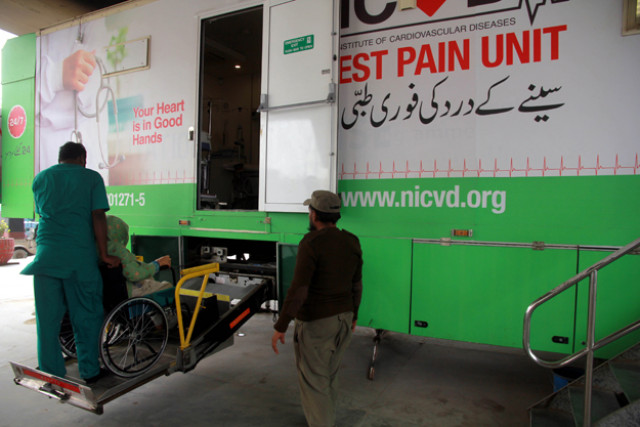Many NMD polling stations lack ramps
Security, other arrangements for elections in newly-merged areas nearly finalised

PHOTO: FILE
Meanwhile, security and other arrangements for the upcoming polls have been given final touches.
According to the report by the Free and Fair Election Network (Fafen), its monitors observed some 674 of the 1,896 polling stations set up for the July 20 elections. Around 50 electoral areas were randomly sampled in each constituency.
The report noted that nearly 68% or 457 of the 674 polling stations it visited lacked ramps at entry points to allow easy movement for specially-abled people. Around 50 polling stations lacked ramps in PK-113 South Waziristan-I and a similar number in PK-115 ex-Frontier Regions. They were followed by PK-108 Kurram-I with 49 and PK-107 Khyber-III with 48.
Further, around 10% or 66 polling stations lacked clean drinking water with PK-115 ex-Frontier Regions at the top with 16 such polling stations. It was followed by PK-106 Khyber-II with 14 and PK-104 Mohmand-II with 13 such polling stations.
Around nine per cent of all polling stations surveyed, or 60 stations, lacked washrooms. These included 18 polling stations in PK-104 Mohmand-II, 14 polling stations in PK-106 Khyber-II and 11 in PK-103 Mohmand-I.
Moreover, four per cent of polling stations, or around25, lacked boundary walls. PK-107 Khyber-III had the highest number of polling stations without walls at 12.
The report further noted that as many as 666 (99%) of the observed polling stations had been set up in proper government buildings or a registered private educational institution. The remaining one per cent or eight observed polling stations were established in premises with no proper buildings.
The most polling stations not in a proper building were observed in PK-107 Khyber-III with four.
The report further notes that in at least two districts, the Election Commission of Pakistan (ECP) had reduced the number of polling stations compared to the number polling stations set up for the general elections a year ago. This was despite the fact that the number of voters in these districts had increased since.
The Fafen report said that the number of polling stations in Khyber tribal district had been reduced from 381 a year ago to 345 even though there had been an increase of 40,243 voters there. This meant that the number of polling stations dedicated to women in the district fell from 154 last year to 137 this year even if the number of combined stations increased from 26 to 27.
Tribal elders want ‘sensitive’ polling stations relocated
Similarly, in the Orakzai tribal district, the number of polling stations had decreased from 177 to 176 with an increase of 29,230 registered voters. Unlike Khyber, Orakzai saw the number of female-only polling stations increase from none in.
In the remaining six districts, the number of polling stations had increased.
However, this did not stop the ECP for failing to meet the limit of keeping 1,200 voters per polling station or 300 per polling booth — set in Section 59(3) of the Elections Act 2017, to improve the efficiency of the polling process. As many as 901 polling booths had more than 1,200 voters assigned to it while there were 335 polling stations were assigned more than 2,000 voters.
In the three constituencies of Khyber where the ECP had reduced a total of 36 polling stations, there were 173 polling stations where more than the prescribed number of voters were assigned, while more than 2,000 voters were assigned on 62 polling stations.
In Orakzai, more than 1,200 voters were assigned on 67 polling stations and more than 2,000 voters were assigned on 10 polling stations.
Security arrangements
The Dera Ismail Khan Regional Police Officer (RPO) Capt (retd) Feroz Shah has finalised security arrangements for elections in tribal districts. He has directed to depute police, Levies, and Khasadar personnel along with quick response units to boost security measures along with the army units which will be deployed in volatile districts.
This was directed in a meeting held by the DI Khan RPO on Wednesday.
During the meeting, it was highlighted that in 33 polling station in D I Khan, 997 police, Levies and Khasadar personnel will be deputed. In Tank, 560 personnel will be stationed to guard 24 polling stations.
In the South Waziristan, the 237 polling stations there will be guarded by as many as 2,769 police, Khasadar and Levies personnel.
Moreover, emergencies will be declared in three districts of Tank, DI Khan and South Waziristan. Leaves of medical staffers and police and other security forces would be cancelled until further orders.
Published in The Express Tribune, July 18th, 2019.













COMMENTS
Comments are moderated and generally will be posted if they are on-topic and not abusive.
For more information, please see our Comments FAQ